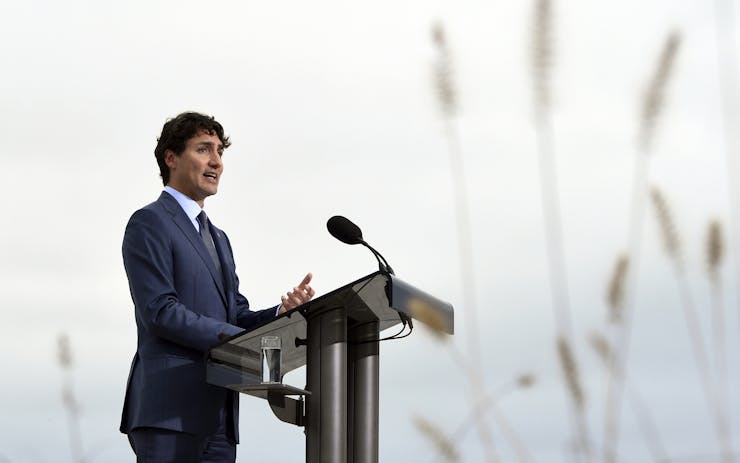With the legalization of recreational cannabis just around the corner, Canadians are talking a lot about sales and distribution, impaired driving, and the impact on children—but little has been said about international law.
If all goes according to the plan laid out by Prime Minister Justin Trudeau, the Cannabis Act will place Canada in violation of three UN treaties. The Single Convention on Narcotic Drugs (1961), the Convention on Psychotropic Substances (1971) and the Convention Against Illicit Traffic in Narcotic Drugs and Psychotropic Substances (1988) all require countries to ban the possession and production of recreational cannabis.
Some legal experts believe Canada should abide by the terms of the treaties, even if it means delaying legalization.
To withdraw from the treaties, a country must give the UN notification a year in advance—so Ottawa would have had to give notice last July in order to withdraw from the treaties before July 2018, the date the Trudeau government has set for legalization of recreational cannabis.
Some legal experts believe Canada should abide by the terms of the treaties, even if it means delaying legalization to allow enough time for withdrawal, while others say that’s not necessary. But all agree the federal government needs to address this issue — something it hasn’t yet done.
Steven Hoffman, a professor in the Faculty of Health and Osgoode Hall Law School at York University in Toronto, is an advocate for the legalization of recreational cannabis, believing its criminalization has had negative legal and health consequences. He also believes the UN treaties are outdated and “not reflective of current science.” But he feels strongly that Canada shouldn’t violate them.
“If we undermine international law it takes away from our credibility as a country and (makes it) more difficult to criticize other countries for violating international law.”
“International law is not an esoteric doctrine. It’s not faraway thing that only nerdy academics think about,” he told Leafly. “It governs international interaction at almost every level, from mailing holiday cards to the functioning of the internet. If we undermine international law it takes away from our credibility as a country—and it becomes politically more difficult to criticize other countries for violating international law.”
Canada should legalize recreational cannabis without violating international law, he said, which would require Ottawa to withdraw from the treaties then wait a year for legalization. He added that Canada could withdraw from the treaties and rejoin after legalization, declaring that it accepts the general concepts of the treaties except in their application to cannabis.
But Hoffman dismissed some other alternatives to withdrawal.
The treaties stipulate that countries aren’t required to implement provisions that violate their constitutions, so amending the Canadian Charter of Rights and Freedoms to include a right to consume cannabis would solve the problem. But Hoffman feels the process of changing the charter would be arduous to the point of being untenable.
Under the rules of the treaties, cannabis could be made available for “scientific purposes.” The government could ramp up its funding of research projects, but that might not be enough to sway international bodies—the Trudeau government has never cited scientific research as its motivation for legalizing recreational cannabis.
John Walsh, director for drug policy at Washington Office on Latin America (an American NGO) and some other pundits have floated the idea of reaching a separate agreement on the cannabis issue with other like-minded countries that have signed the treaties. Hoffman acknowledges that the Vienna Convention allows for this, but says those agreements are intended to tighten treaty restrictions, not loosen them.
Walsh and others also say Canada could remain a signatory to the treaties while publicly acknowledging that its legalization of recreational cannabis will result in a period of “respectful non-compliance” with some treaty obligations. They say this approach would display the appropriate regard for international law. Respectful or not, this approach is a violation of international law and not advisable, says Hoffman.
‘No Need for Hasty Decisions’
Ultimately, the consequences of violating the treaties are not dire, according to Walsh and four other political pundits who collaborated on an opinion piece for the website ipolitics. They point out that Uruguay, the first country to regulate cannabis, has violated international drug laws and has suffered nothing more than a mention in the annual reports of an organization that monitors the implementation of UN drug conventions. The US states that have legalized recreational cannabis have had a similar experience.
The Trudeau government certainly doesn’t seem to be in a rush to address the matter. It has said next to nothing about it.
“The bottom line is that Canada ultimately will need to choose a path forward with regard to cannabis regulation and the drug treaties,” Walsh and the others wrote. “But there is no need for hasty decisions and plenty of time for Canada to evaluate its options—and act when the time is ripe.”
The Trudeau government certainly doesn’t seem to be in a rush to address the matter. It has said next to nothing about it.
Meanwhile, opposition politicians are demanding action. “The government has a position to legalize [cannabis] which contravenes the terms of those three treaties and so the government should be upfront and respect the signatories to the treaty and withdraw,” Conservative foreign affairs critic Peter Kent said in June. “We would condemn the government allowing Canada to go into violation of the treaties.
“The bottom line is, we believe Canada … should be principled with all of its dealings with the international organizations with which we have treaties and agreements,” he said.
Hoffman shares that view. “We are increasingly depending on international law,” he told Leafly. “It’s weak, but it’s the strongest one we have.”





